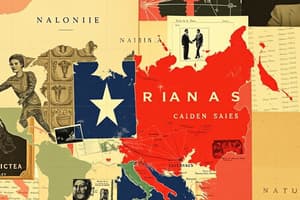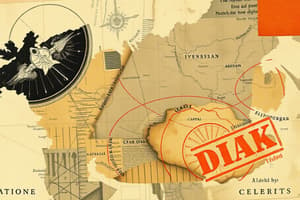Podcast
Questions and Answers
What is a theocracy?
What is a theocracy?
- A democracy with elected officials
- A form of government with a king
- A state under the control of religious leaders (correct)
- A military government
What does decolonization refer to?
What does decolonization refer to?
The movement of American, European, or Asian colonies gaining independence after the post-WWI era.
What does the Brandt line illustrate?
What does the Brandt line illustrate?
The economic division between wealthy and poorer countries.
Define an enclave.
Define an enclave.
What is an exclave?
What is an exclave?
What are expatriate populations?
What are expatriate populations?
What is the European Union?
What is the European Union?
What defines an immigrant state?
What defines an immigrant state?
Define a multicore state.
Define a multicore state.
What is a shatterbelt?
What is a shatterbelt?
What does the shatterbelt theory predict?
What does the shatterbelt theory predict?
What is a forward capital?
What is a forward capital?
What does the term 'new world order' refer to?
What does the term 'new world order' refer to?
Define the domino theory.
Define the domino theory.
What is supranationalism?
What is supranationalism?
What are supranational organizations?
What are supranational organizations?
What is a territorial sea?
What is a territorial sea?
What are the high seas?
What are the high seas?
What is admirality law?
What is admirality law?
What does the international whaling commission do?
What does the international whaling commission do?
What is a constitutional monarchy?
What is a constitutional monarchy?
Define an absolute monarchy.
Define an absolute monarchy.
What is devolution?
What is devolution?
What is the Heartland-Rimland Theory?
What is the Heartland-Rimland Theory?
Study Notes
Political Geography Vocabulary
-
Theocracy: Government believed to be divinely guided or controlled by religious leaders; intertwines governance with faith.
-
Decolonization: Process where colonies in the Americas, Europe, and Asia gained independence, largely beginning post-World War I.
-
Brandt Line: Economic divide distinguishing wealthy nations in Europe, North America, Japan, and Australia from poorer regions in Asia, Africa, and Latin America.
-
Enclave: A minority cultural group residing within a dominant culture, often leading to unique social dynamics within a larger nation.
-
Exclave: A separate piece of a state's land that is geographically disconnected from the main territory, highlighting territorial fragmentation.
-
Expatriate Populations: Citizens living abroad, often requiring government services such as consular support for legal documentation.
-
European Union (EU): Supranational body formed in 2007, acting as a federal-like government for Europe, managing areas like trade and legislation without full administrative integration.
-
Immigrant State: A destination country attracting large numbers of immigrants due to its strong economy, political freedoms, and opportunities for advancement.
-
Multicore State: A nation with multiple dominant economic or political regions, leading to diverse decision-making centers within its territory.
-
Shatterbelt: A geopolitical zone caught between conflicting external cultural and political forces, frequently characterized by instability and rivalry.
-
Shatterbelt Theory: Cohen's prediction regarding post-1950 armed conflicts occurring in regions within the Inner Crescent, particularly the Middle East.
-
Forward Capital: A strategically or economically relocated capital city meant to promote integration of peripheral areas into a nation.
-
New World Order: Refers to the envisioned international landscape after the Cold War, where bilateral tensions between superpowers lessen, promoting cooperative global governance.
-
Domino Theory: The belief that the spread of communism in one region would lead to its expansion elsewhere, justifying U.S. interventions during the Cold War.
-
Supranationalism: Conceptual framework where sovereign states collaborate for mutual objectives, transcending individual national interests.
-
Supranational Organizations: Groups formed for collaborative purposes, including trade alliances, military cooperation, and diplomatic efforts.
-
Territorial Sea: A maritime zone extending 12 nautical miles from a coastline where a nation enforces its laws and regulations.
-
High Seas: Areas beyond the territorial sea limit where vessels have autonomy, allowing activities like gambling and law enforcement onboard.
-
Admiralty Law: Set of international regulations governing legal matters on the seas, particularly beyond 200 nautical miles, influencing fishing and maritime conduct.
-
International Whaling Commission: Established in 1986, this body enforces a ban on commercial whaling globally, protecting marine life.
-
Constitutional Monarchy: A political system where a monarch is the ceremonial head of state and a democratically elected parliament functions as the governing body.
-
Absolute Monarchy: A governance model where the monarch holds total power, serving as both head of state and government without legislative limitations.
-
Devolution: Process akin to centrifugal forces leading to the fragmentation of a state, often due to internal conflict and calls for regional autonomy.
-
Heartland-Rimland Theory: Proposed by Halford Mackinder in 1904; a framework assessing geopolitical control potential based on agricultural and geopolitical landscapes.
Studying That Suits You
Use AI to generate personalized quizzes and flashcards to suit your learning preferences.
Description
Test your knowledge of key vocabulary in Political Geography as covered in AP Human Geography. This quiz features terms such as theocracy, decolonization, and the Brandt line, encouraging a deeper understanding of global political structures and histories.




